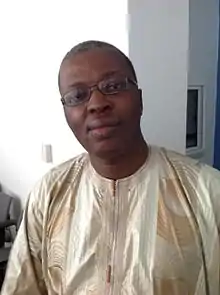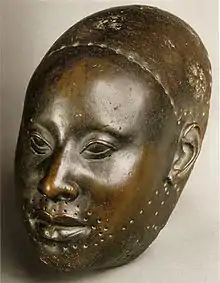Oku people (Sierra Leone)
The Oku people or the Aku Marabout or Aku Mohammedans are an ethnic group in Sierra Leone and the Gambia primarily the descendants of educated, liberated Yoruba Muslims from Southwest Nigeria, who were released from slave ships and resettled in Sierra Leone as liberated Africans or came as settlers in the mid-19th century. Some Oku historically have intermarried since then with the ethnic Creole people. The Creole were primarily descendants of African-American former slaves, as well as some from Jamaica, and slaves liberated from illegal slave trading in the 19th century. The Oku people primarily reside in the communities of Fourah Bay, Fula Town, and Aberdeen and the official cemetery primarily used by the Oku people is the Aku Mohammedan Cemetery.
 | |
| Total population | |
|---|---|
| 25,000 (0.5% of population) | |
| Regions with significant populations | |
| Sierra Leone, Gambia | |
| Languages | |
| Religion | |
| Sunni Islam (99%) | |
| Related ethnic groups | |
| Yoruba people |
.jpg.webp)
| Part of a series on |
| Yoruba people |
|---|
 |
| Subgroups |
| Music |
|
Contemporary: Folk/Traditional: |
| Notable personalities |
| List of Yoruba people |
| Religion |
| Diaspora |
| Festivals and events |
|
West Africa:
Diaspora:
|
Some 99% of the Oku are Muslim, following the Sunni tradition of Islam. They are known for their deeply conservative and distinctly Yoruba traditions including the acceptance of cliterodotomy and polygamy, but some of them have also embraced Western education and other elements of Western culture.
During their rule, the British colonial government provided official recognition to the Oku community as a distinctive community in Sierra Leone. But since independence, the national Sierra Leone government has officially classified the Oku people as non-native 'Creoles'.
The Oku people have an extensive diaspora with Oku communities being established in the Gambia and in Nigeria. The Oku people in Sierra Leone reside mainly in the capital Freetown, particularly in the neighborhoods of Aberdeen Village, Fourah Bay and Fula Town. Most Oku people have Islamic first names and surnames although some have English last names. Most Oku people also have Yoruba middle names.
Origin
The Oku people are descended mainly from Yoruba Liberated Africans who were resettled in Sierra Leone during the nineteenth century. These Liberated Africans formed a distinctive community that was settled at Aberdeen village, Fourah Bay, and Fula Town. As early as the 1840s, there were references to them in documents to 'Aku Mohammedans.' Because the communities at Fourah Bay were dominated by members of the Yoruba, the people were referred to as 'Aku' or 'Oku' Mohammedans.
Culture
The Oku people have a distinctive culture that has strong similarities to that of larger communities of Muslim Yoruba people. The Oku often have Arabic first and last names. Some Oku people later adopted the names of prominent benefactors such as Savage, or other European surnames, which they thought aided admission into the missionary schools. Some elder members of the Oku community have continued to speak the Yoruba language, in addition to the Oku variety of the Krio language.
Relationship with the Sierra Leone Creole people
Several scholars such as Ramatoulie Onikepo Othman and Olumbe Bassir classify the Oku as distinct from the Creoles because of their predominately Yoruba ancestry and strongly Muslim, conservative culture including the practice of cliterodotomy and polygamy. The Oku practice cliterodotomy, participate in traditional African societies such as the Bundu, respect traditional hereditary political leaders such as the Alkadi, and follow specific Muslim tenets.
In contrast to the Oku people, the Creoles or Krio are Christian and are a mixture of various ethnic groups including African Americans, Caribbeans, and Liberated Africans of Igbo, Fanti, Aja, Nupe, Bacongo, and Yoruba descent in addition to other African ethnic groups. Furthermore, the Creoles do not practice cliterodotomy, engage in the Bundu society, and are monogamous.[1]
Some scholars consider the Oku to be a sub-ethnic group of the Creoles or Krio, based on their close association with British colonists and their adoption of Western education and other aspects of culture.[2] Those classifying the Oku as part of the Sierra Leone Creole people note their adoption of similar English or European surnames and cultural aspects such as Awujoh.
Community organisation
Oku communities in Sierra Leone are represented by an Alkadi, the community leader and Imam.
Cultural associations
The Oku people are represented by cultural associations such as the Ebilleh Cultural Organization. It aims to preserve and enhance Oku Muslim cultural heritage in Sierra Leone and abroad.
Notable Oku in or from Sierra Leone
- Nemata Majeks-Walker, nee Mahdi
- Ramatoulie Othman
- Olumbe Bassir
- Ahmed Deen, footballer
- Isha Johansen (born Isha Savage), president of the Sierra Leone football association
- Haja Afsatu Kabba (born Haja Afsatu Savage), politician who served as an appointed minister of energy and power, and a former member of Sierra Leone parliament
- Umaru Rahman, international footballer
- Mohamed Sanusi Tejan, Muslim scholar
- Madieu Williams, Sierra Leonean-American professional football player
- Gibril Wilson, American professional football player
- Muhammad Sanusi Mustapha- Politician
References
- Bassir, Olumbe (July 1954). "Marriage Rites among the Aku (Yoruba) of Freetown". Africa: Journal of the International African Institute. 24 (3): 251–256. doi:10.2307/1156429. JSTOR 1156429.
- Cole, Gibril R. (15 September 2013). The Krio of West Africa: Islam, Culture, Creolization, and Colonialism in ... ISBN 9780821444788. Retrieved 16 March 2015.